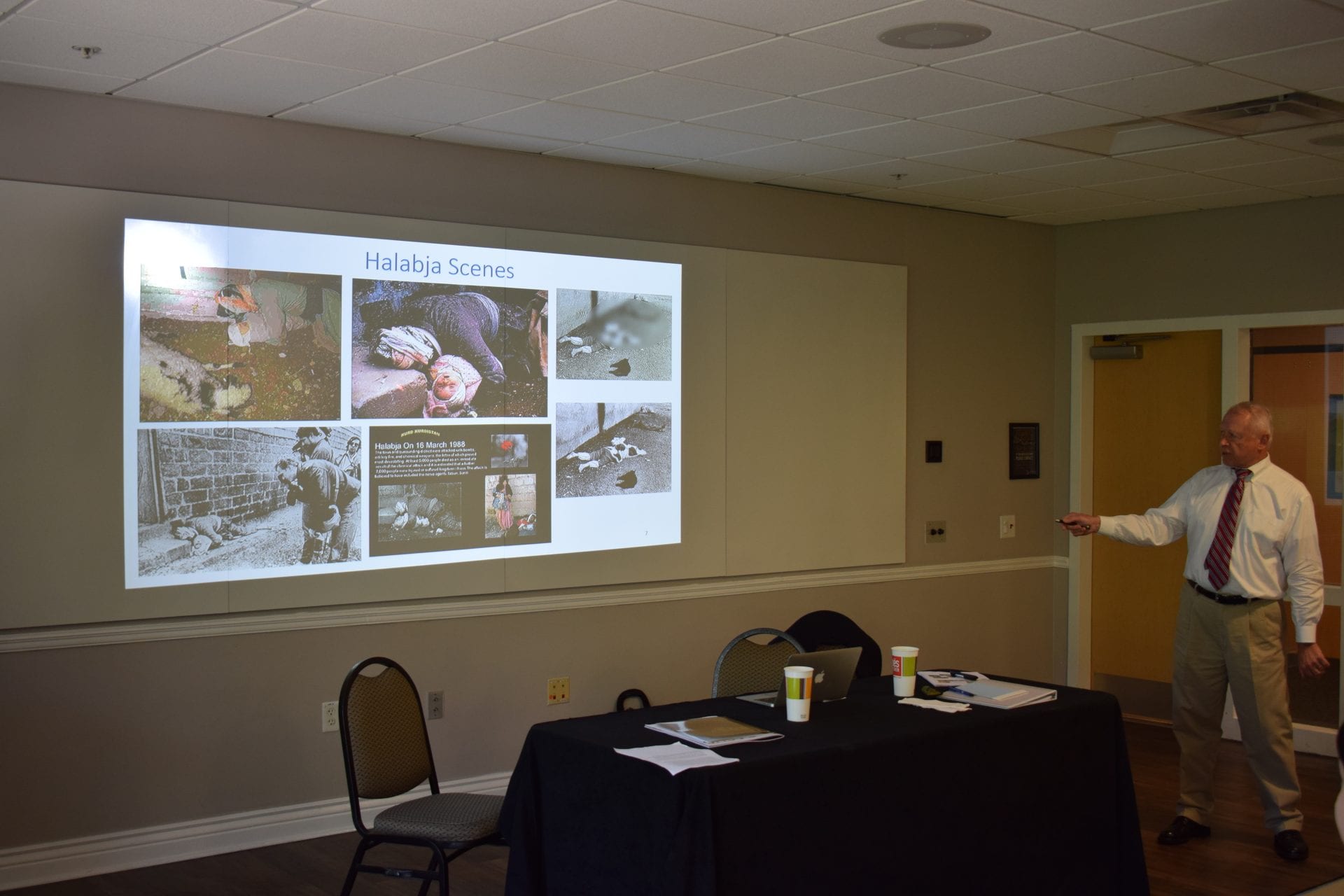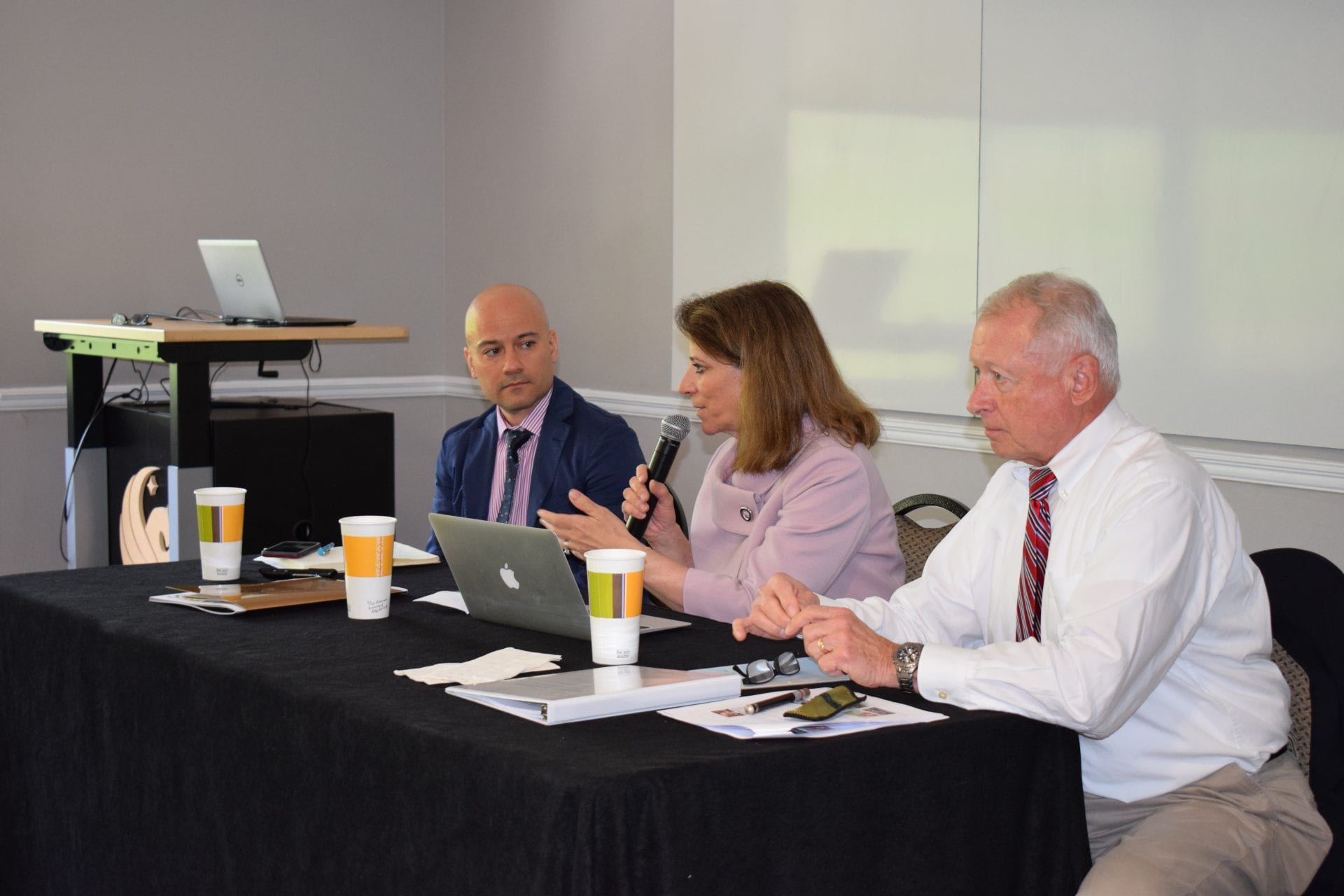50 Students Attend Panel on Chemical Attacks

Thirty years after the attacks in Halabja in Iraqi Kurdistan, chemical weapons continue to be used against civilian populations in the Middle East. On April 12, 2018, the Kurdish Political Studies Program (KPSP) in collaboration with the Intelligence Community Center for Academic Excellence (IC CAE) sponsored a panel on the chemical attacks and U.S. policies.
The event featured two distinguished speakers who attracted an audience of more than 50 people and led to a lively Q&A. The speakers explored the validity of the chemical weapons taboo, U.S. and international reaction to the usage of chemical agents in Douma, Syria, on April 9, 2018, and the challenges associated with ongoing attempts to control and dismantle them.
Güneş Murat Tezcür, Ph.D., Jalal Talabani Chair of Kurdish Political Studies, opened up the event and introduced the speakers. John Gilbert, consultant on arms control issues for the U.S. Air Force, the Department of Energy and the International Atomic Energy Agency (IAEA), provided some background information on the types of chemical weapons, the differences in use and effects of blister, nerve and choking agents. He also explored the origins of the 1925 Geneva Protocol and 1997 Chemical Weapons Convention (CWC). There are 192 countries on the Convention, excluding Israel, North Korea, South Sudan and Egypt.

Gilbert discussed Saddam Hussein’s chemical weapons attack on Halabja (pictured left) that killed 3000 to 5000 people and injured 8000 to 10,000. With visceral visual aids, he explained how different agents such as sarin, VX, tabun and chlorine, have different effects on humans and can be identified from victims’ bodies.
The second speaker, Lori Murray, Ph.D., adjunct senior fellow at the Council on Foreign Relations and president emeritus of the World Affairs Councils of America, expanded on the foreign policy and international reactions to Halabja. She explained Halabja was a defining moment in history because the attack provided a momentum and an impetus to the CWC negotiations. She emphasized how the deaths in Halabja were not in vain and led to the formation of a robust chemical weapons regime at the international level, enshrining a global norm, a legal basis and monitoring and enforcement mechanisms.
Murray also bridged the implementation of the CW to recent chemical weapons attacks. The Islamic State has used chemical weapons at least once since 2013, and the Syrian regime has been thought to use them multiple times.
The Organisation for the Prohibition of Chemical Weapons, made it possible to verify the attacks and identify responsible actors. Murray explained the difficulties in holding regimes accountable for such attacks without causing a broader conflict. She highlighted the importance of U.S. leadership on the chemical weapons taboo.

After the presentation, the floor was opened up for questions from the audience. One student was skeptical about the ability to identify the group responsible for chemical attacks in the Middle East. Gilbert explained the multiple mechanisms available for assigning responsibility and demonstrated the non-state actors could not have executed the chemical attack on Khan Shaykhun in Syria in April 2017. Opposition forces reported the observation of airplanes and radar tracking showed the airways of Syrian aircraft above the location. The treated victims exhibited evidence consistent with a sarin attack. Debris collected at the scene hinted to the substances which are only possessed by the Syrian regime.
Another student asked about the U.S. strategy to end the conflict in Syria. Murray explained the US-Russian tensions and rivalry heavily complicate the enforcement of the CWC. A collective international response to Assad’s use of chemical weapons could push Russian president Vladimir Putin into isolation. A strike would provide leverage in diplomatic negotiations. Gilbert added it should be kept in mind that no country has developed a chemical weapons capability to use against the U.S. and its interests. Historically, no country has risked an attack against the U.S.
The audience was very interested in the future role of the U.S. Murray argued U.S. leadership is important for the global consensus and moral wrongdoings such as chemical weapons attacks. Without the U.S., who would take a leading role in promoting and protecting human rights? Murray expressed there could hardly be action or global leadership expected from other powers such as China and Russia.
The KPSP thanks the IC CAE for their collaboration, and the UCF Global Perspectives, UCF Department of Political Science, and Prince Mohammad Bin Fahd Program for their great support in organizing the panel. More information about the KPSP can be found here.
